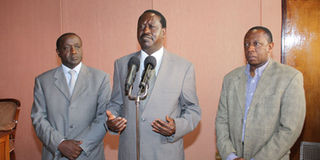Mediator Raila arrives in crisis-hit Côte d'Ivoire

Kenya's Prime Minister Raila Odinga speaking at Jomo Kenyatta International Airport shortly before he left the country to Cote d'Ivoire. PMPS photo
ABIDJAN, Jan 3, 2011
Kenya’s Prime Minister Raila Odinga arrived in Ivory Coast on Monday to try to end a deadly presidential crisis and persuade defiant incumbent Laurent Gbagbo to quit and avoid an armed intervention.
Three African heads of state, as well as Odinga, on behalf of the African Union, are expected here Monday in a bid to end the stand-off between Gbagbo and the man the world says beat him to the presidency, Alassane Ouattara.
Odinga, who has previously called for Gbagbo’s removal by force, arrived in Ivory Coast after talks in Nigeria with President Goodluck Jonathan, who also heads the 15-nation Economic Community of West African States (ECOWAS).
Odinga said on Sunday that he would keep an open mind on finding a solution for Ivory Coast following disputed presidential elections.
“We don’t want to pre-empt anything. We just want to talk to him (Gbagbo) and we will see what happens,” Odinga told AFP.
“It depends on how Gbagbo wants to handle it.”
Odinga will meet the Ivory Coast strongman alongside the three regional presidents, who are due to return to Abidjan on behalf of Ecowas at around 1000 GMT.
Benin’s Boni Yayi, Sierra Leone’s Ernest Koroma and Cape Verde’s Pedro Pires have so far failed to convince Gbagbo to step down despite Ecowas brandishing the threat of military intervention to oust him if mediation fails.
Jonathan has said Ecowas will decide by Tuesday how to handle the impasse, which threatens to erupt into civil conflict and could affect Ivory Coast’s neighbours.
West African regional military chiefs met in Abuja last week and set in motion plans to oust Gbagbo if negotiations fail, according to a Nigerian defence spokesman.
A follow-up meeting to fine-tune the “last-resort” plan is scheduled for Mali on January 17 and 18.
Tensions have risen steadily in the deadly standoff since Gbagbo and Ouattara both claimed victory in a November 28 presidential run-off vote that it was hoped would end a decade of crisis in Ivory Coast.
Gbagbo and Ouattara have fired off a series of deadlines at each other since then, with Ouattara’s latest call for Gbagbo to quit expiring unheeded at midnight on New Year’s Eve.
In return, Gbagbo’s notorious “Street General”, Minister for Youth Charles Ble Goude, urged Ivorian youths to rise up after the New Year to seize control of Ouattara’s besieged headquarters in the waterfront Golf Hotel resort.
But on Sunday, Ble Goude called off his threat, saying he wanted to give a chance to diplomatic efforts, for now.
Ouattara’s once-plush hotel is protected by a small contingent of lightly armed former rebel fighters known as the New Forces and 800 United Nations troops equipped with armoured vehicles and re-supplied by helicopter.
It is surrounded by Gbagbo’s well-armed regulars, the Ivory Coast Defence and Security Forces (FDS), but there are fears of a repeat of 2004 violence if Ble Goude makes good on his threat to send unarmed youths to storm the hotel.
Against the background of building diplomatic momentum, calls have grown for alleged massive human rights violations to be investigated, including reports of mass graves of Gbagbo’s opponents.
The UN says that at least 179 people have been killed in post-election violence but that it has been unable to fully investigate because of attacks on its personnel.
UN Secretary General Ban Ki-moon on Saturday reaffirmed the world body’s “unwavering” support for Ouattara and said he was “alarmed by the reports of egregious human rights violations”.
The UN mission has “been instructed to do everything possible to gain access to the affected areas both for prevention and to investigate and record the violations so that those responsible will be held accountable”.
Gbagbo on Saturday accused the 9,000-strong UN peacekeeping mission ONUCI of firing on civilians, a charge denied by the UN.




